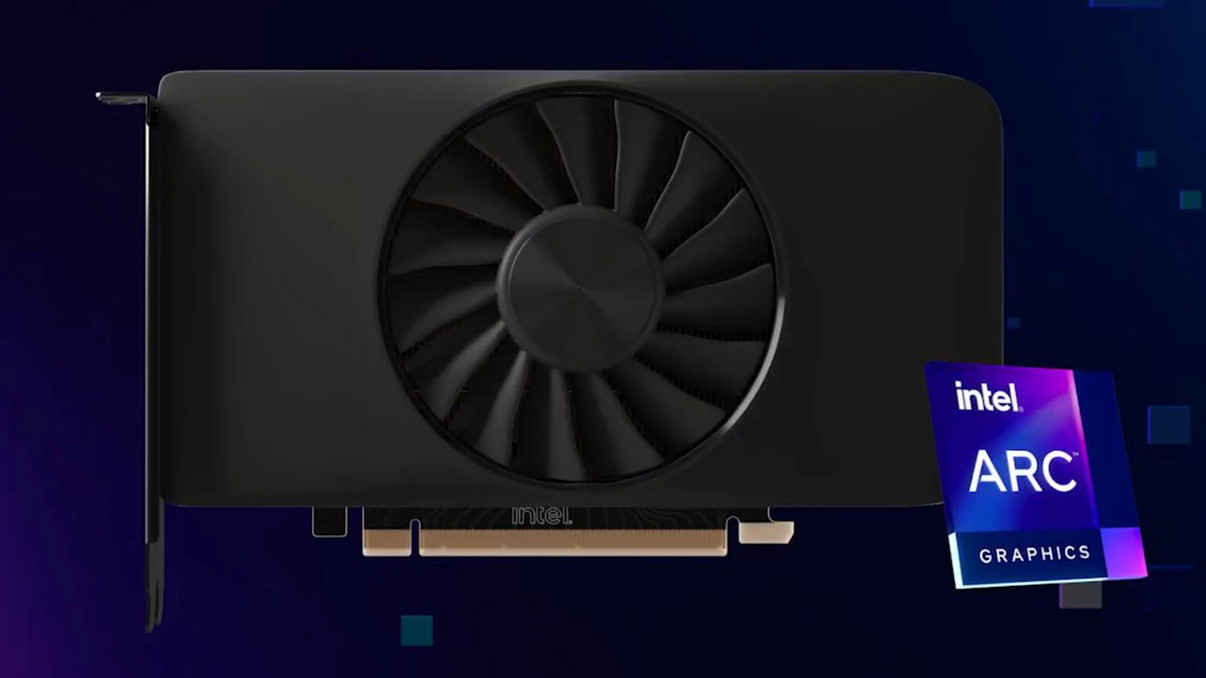Intel is about to unleash first Arc desktop GPU – but you won’t be able to buy one
Intel Arc A380 is only out in China, and just in prebuilt PCs for now

Sign up for breaking news, reviews, opinion, top tech deals, and more.
You are now subscribed
Your newsletter sign-up was successful
Intel has officially announced the availability of its first Arc desktop GPU, but the catch – as we already knew – is that it’s only going to be sold in China initially, appearing in prebuilt PCs to begin with from later this month.
Team Blue is kicking off with the Intel Arc A380 GPU, an entry-level model which comes equipped with 8 Xe Cores, a base clock of 2GHz, 6GB of GDDR6 VRAM (with a 96-bit memory bus), and a 75W TDP.
As a wallet-friendly desktop graphics card the A380 comes with a recommended price tag of 1030 yuan over in China, and that’s equivalent to around $150 / £130 / AU$220 (remember that direct currency conversions aren’t always that useful in terms of ascertaining card pricing in other regions, though).
Intel compares the A380 to the RX 6400 in its launch press release, as VideoCardz spotted, and claims that its budget graphics card is up to 25% better than the AMD GPU for performance per yuan, so in other words, the value proposition in terms of the overall frame rates gamers are getting compared to the financial outlay. Although launch stats and soundbites from the maker are one thing, as they’re inevitably cherry-picked to show the card in its best light, while independent testing is, of course, a different beast entirely.
The first A380 graphics cards will be arriving in PCs built by Acer, Asus, Gigabyte, Gunnir, HP, and MSI starting from this month in China as mentioned, with availability of standalone cards (models sold separately on the shelves) will follow thereafter.
As a final note, we’ve already caught a glimpse of Gunnir’s A380 graphics card, and it’s not exactly bowling us over, shall we say….
Analysis: A hint that we might see Arc desktop GPUs a bit sooner outside of China?
With the A380 announcement, Intel also gave us a set of gaming benchmarks broadly claiming a smooth (60 frames per second, at least) gaming experience at 1080p in a clutch of less taxing games, which included League of Legends and PUBG: Battlegrounds, as well as Naraka: Bladepoint. So that gives you some idea of what performance to expect, with a solid amount of grunt to drive Full HD gaming, at least outside of more demanding PC games – and with the caveat that these titles were running at medium details (so they weren’t looking their best).
Sign up for breaking news, reviews, opinion, top tech deals, and more.
Considering the A380 looks to be pitched around the $150 mark, it seems like it could be a robust value option for gamers with tight budgets – although the comparison to the value proposition of the RX 6400 doesn’t exactly fill us with confidence, given that this particular low-end GPU is an easy target really (failing to impress widely since its release). The other cause for concern is how Intel‘s graphics driver is going to perform across a gamut of games, of course (whereas AMD, and indeed Nvidia, have well-established drivers); and the reason for the initial China-only launch could be wrapped up in that.
What’s interesting to note in terms of the Arc desktop release schedule is that Intel says the A380 is coming inside pre-built PCs in China this month as mentioned, so that’s happening within the next week or two, followed by the standalone A380 desktop GPUs. Intel further notes that this will be “followed shortly by system and component sales in other regions”, which should mean the US and Europe (we would hope).
If we compare this to the (rough) timeframe that Intel previously informed us of, Team Blue didn’t mention the A380 coming ‘shortly’ after it had become available across China, rather only stating that the higher-tier A5 and A7 global GPU rollout would start later in the summer. So, could this be read as a hint that we might see the A380 outside of China perhaps later in July? Maybe, but as ever, we’ll just have to wait to find out – though it’s still possible that any plans for the worldwide launch which are in place now could slip, anyhow.
Darren is a freelancer writing news and features for TechRadar (and occasionally T3) across a broad range of computing topics including CPUs, GPUs, various other hardware, VPNs, antivirus and more. He has written about tech for the best part of three decades, and writes books in his spare time (his debut novel - 'I Know What You Did Last Supper' - was published by Hachette UK in 2013).